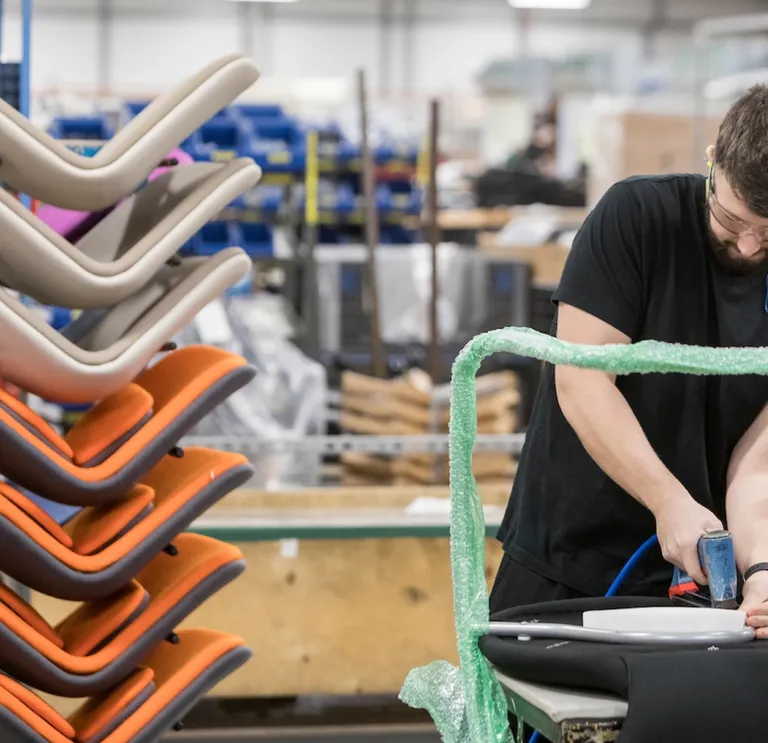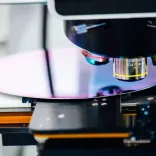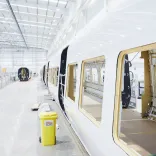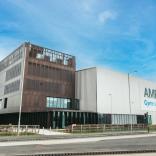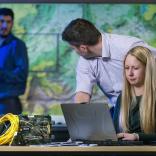Engineering and construction
Griffiths is one of the UK’s Top 20 civil engineering and construction contractors working in Wales, the English border counties and the west of England, with an annual turnover of circa £150m.
The company, which has its HQ in Abergavenny, puts sustainability at the heart of its business and was the winner of the Sustainable Business Award at the 2017 Cynnal Cymru – Sustain Wales awards. The judges noted Griffiths’ in-house Sustainability Challenge - an annual sustainable development action plan, with four key headings closely aligned with the seven wellbeing goals of the Welsh Government’s Future Generations Act.
But how does that look in practice for a busy, profitable business? Since implementing the Sustainability Challenge, Griffiths has ultimately reduced its waste, minimised carbon emissions intensity, recruited and trained apprentices, supported local communities and helped to strengthen the Welsh economy. 90 percent of Griffiths’s waste is recycled, and in 2017 the company reduced its carbon emissions by 9 percent. 44 percent of staff received environmental awareness training and more than £25,000 has been spent on a Griffiths cycle to work scheme. The company also donated £200,000 to local charities and community groups.
By recruiting apprentices and trainees Griffiths also reduced the average age of its workforce, improved the ratio of female to male employees and led Women in Construction Workshops at local colleges and training providers, making a mark in sustainable and equal employment in Wales.
Tourism
In the tourism sector, the Green Key eco-label is awarded to more than 2,800 hospitality providers in 57 countries worldwide. In Wales, Green Key is operated by Keep Wales Tidy, who also manage the iconic Blue Flag programme and recognises tourism businesses that are committed to caring for the environment.
There are now 20 Green Key accredited tourism sites in Wales including Trevayne Farm Caravan and Camping in Tenby. The campsite has proactively embraced sustainable tourism practice with a user-friendly recycling and compost area as well as installing systems to help reduce water waste from toilets, showers and sinks and simply encouraging its customers to ‘switch off’ and enjoy their natural surroundings. The campsite also has an on-site farm shop selling locally sourced produce, where it has replaced plastic with glass for milk and drinks, set up a refillable water filling station and banned plastic bags. Other Green Key tourism sites across Wales include The Red Boat Ice Cream Parlour in Beaumaris, Folly Farm Adventure Park and Zoo in Pembrokeshire and The Bryntirion Inn in Bala.
Entertainment and sport
It’s a truly iconic Welsh site, but it’s perhaps not as well-known that Principality Stadium is an award-winning, low carbon venue. When the 74,500 capacity stadium was built to host the 1999 Rugby World Cup matches, managing the overall environmental impact of an event was not high on the agenda. But by 2010 the venue had hosted 300 major events, 10 million visitors and recognised the real need to implement a sustainability policy to demonstrate sound environmental practice, reduce its carbon footprint and build for a better future. The WRU announced its bid to make the stadium the UK’s first certifiably sustainable stadium and set out to achieve the standard within the first 12 months.
A comprehensive, wide-ranging sustainability strategy was implemented across all areas of the stadium’s operations and the goal was achieved within a year.
Since then, the Principality Stadium has continued to develop and maintain its low carbon, waste reduction and sustainable approach, as well as engaging with and supporting the local economy, encouraging active and sociable life and promoting health and wellbeing across all areas of the business.
Manufacturing
Leading the way in energy efficient and sustainable practice in Wales in 2018 is Orangebox, which was recently acquired for £63 million by NYSE-listed Steelcase. With its origins in Hengoed and bases in London, Cardiff, Huddersfield, Dubai and New York, Orangebox supplies office smartworking systems to its worldwide clients, from seating systems that promote agile working, to acoustic pods. The smart method is also translated to its own practices, including Orangebox’s ‘No Green Bull’ approach to sustainability. The company has committed to ensuring its in-house design team grows the company via products and services that are focused on being as environmentally smart as they are commercially successful, as well as operating its two production facilities to minimise energy use and unnecessary waste. Orangebox also operates a make to order system to avoid obsolete stock, as well as digital fabric cutting on its products to maximise fabric utilisation and low energy lighting.
